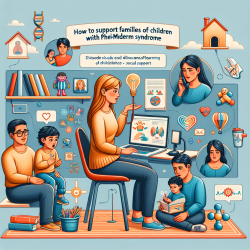Introduction: A New Era of Care
The COVID-19 pandemic has significantly reshaped healthcare delivery, particularly for vulnerable populations such as older adults with cognitive impairments. The research article "Telehealth for the Cognitively Impaired Older Adult and Their Caregivers: Lessons from a Coordinated Approach" offers valuable insights into adapting care models to meet these challenges. As practitioners, we can leverage these findings to enhance our telehealth practices, ensuring comprehensive care for our patients and their caregivers.
Key Insights from the Research
The Montefiore-Einstein Center for the Aging Brain developed the Coordinated Care At Risk/Remote Elderly (CCARRE) program to address the unique needs of cognitively impaired patients during the pandemic. The program's success highlights several critical strategies:
- Starting with Phone Calls: Initiating contact via phone before transitioning to video can ease patients and caregivers into telehealth, enhancing comfort and compliance.
- Real-Time Safety Evaluations: Video visits provide a unique opportunity to assess the home environment for safety risks, which is crucial for high-risk populations.
- Addressing Caregiver Stress: The pandemic increased caregiver stress, but telehealth visits allowed for the discussion of behavioral management techniques and support resources.
- Advance Care Planning: The crisis highlighted the importance of discussing advance care plans, a conversation that telehealth can facilitate effectively.
Implementing Telehealth Best Practices
Practitioners can adopt several strategies to improve telehealth services based on the research findings:
- Multidisciplinary Approach: Collaborate with a team of specialists to provide comprehensive care, addressing both medical and psychosocial needs.
- Address Social Determinants of Health: Consider factors such as food insecurity and housing stability, connecting patients with community resources as needed.
- Cultural Sensitivity: Be mindful of cultural, racial, and language barriers, using culturally competent approaches to engage patients and caregivers effectively.
Encouraging Further Research
While the CCARRE model has demonstrated success, further research is needed to validate telehealth tools and practices. Practitioners are encouraged to contribute to this growing field by sharing their experiences and data, helping to refine and optimize telehealth services for diverse populations.
Conclusion: A Path Forward
The transition to telehealth has provided a unique opportunity to rethink and improve care for cognitively impaired patients. By adopting a coordinated, multidisciplinary approach, practitioners can ensure that these vulnerable populations receive the comprehensive care they need. As we continue to navigate the challenges of the pandemic and beyond, telehealth will remain a vital tool in our healthcare arsenal.
To read the original research paper, please follow this link: Telehealth for the cognitively impaired older adult and their caregivers: lessons from a coordinated approach.










